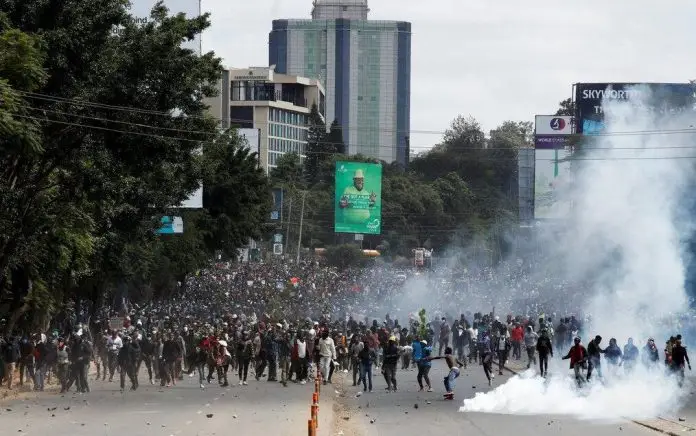The Kenyan president, William Ruto, promised to restore order after violent protests broke out over a contentious tax, measure passed by Parliament on Tuesday. He blamed dangerous individuals for organizing the riots.
In a speech to the nation, he issued a warning, saying that his government would stop at nothing to quell,
‘legitimate protests against his policies that had been hijacked by a group of organized criminals;’ all costs to ensure that the carnage never happened again.
Read Also: The presidency condemns Aisha Yesufu’s remarks about Tinubu being ignored by the SA president.
‘The events of today represent a turning point in how we respond to threats to our peace,’ he declared. ‘We’ll take steps to prevent a situation like this from happening again.’
Following days of increasingly intense street protests, the President’s speech was an attempt to regain control in both quantity and potency.
They got worse on Tuesday, with hundreds of people hurt, at least five people shot dead, and a portion of the nation’s parliament building going up in flames.
After running for office in 2022 on a platform of eliminating corruption, bolstering the flagging economy, and aiding the impoverished,
The beleaguered president is currently facing an unprecedented uprising against a bill that he claims is crucial to his vision for the country’s development.
As a shrewd political operator, Ruto served as Deputy President for nearly ten years before winning the presidency, giving him years of expertise in navigating politics to accomplish goals.
But now, he is genuinely powerless against the forces gathered against him.]
A movement that began as social media discontent expressed naturally has developed into a strong uprising that has crowded the streets of cities nationwide.
The nation’s parliament, City Hall, and the Nairobi governor’s office were all set on fire today afternoon in the nation’s capital.
Threatening a ‘total shutdown,’ the demonstrators had begun the day.
And there’s no denying that their rage has been heard after a day of anarchy and fear that shook the entire nation, frequently to the sound of tear gas and occasionally live police fire.
To calm the nation, Ruto has resisted the demonstrators’ requests by pushing back against their budget rather than caving into their demands.
Some in his government may be concerned about the viability of that position and its future implications longer term, his contentious financial bill.
A plethora of new levies, according to President Ruto, are necessary to rein in Kenya’s massive debt,
which stands at over $80 billion and requires the payment of more than half of the nation’s yearly tax income.
Kenya’s currency instantly saw a rise in value after it was able to achieve a restructuring of its international debt obligations earlier this year.
Considered one of Africa’s most influential statesmen, Ruto just returned from a state visit to the White House and knows how crucial it is to his country’s economy to avoid going into default on its debt.
People in his administration determined that raising taxes to regulate state finances was a better option than reducing public services.
The plan, which is set to go into effect on Monday, initially included numerous additional or new taxes on a variety of items, including sanitary pads, banking transactions, and car ownership.
After public consultation, a few of the more controversial taxes have already been removed.
However, Ruto’s other revenue-raising initiatives, such as higher taxes on healthcare and affordable housing, came before the budget dispute.
Beyond reducing services or raising taxes, the government also has a third option for persons who are homeless.
People are reluctant to pay extra taxes because they don’t trust the government’s transparency, and many attribute the nation’s financial problems to corruption.
Ruto’s current position may have been shaped by the shadows of his previous so challenging.
Even though he is a new president, he has fresh ideas for the future of Kenya, emphasizing technology and renewable energy.
Many people on the streets, however, find it difficult to trust the President with their taxes because of his past as a prominent, government official during a time tainted by corruption.
Mr. Ruto appears to be in a difficult situation as a result of today’s events in Nairobi.
Confronted with censure for what numerous Kenyans perceive as an oppressive reaction to public protests,
he has opted to confront those whom he holds accountable for allowing the rallies to get out of hand.
However, not many of those who showed up to speak out in Nairobi and throughout the nation displayed any indication of quitting.
Ruto talked directly to the nation’s politically engaged youth during his inauguration speech last year.
He told them that ‘my political journey similarly began as a young campaign volunteer, right out of university.’
‘The foundation of your leadership journey should be your experience and the lessons you have learned.’
Currently, Kenya is facing what many see as its biggest challenge to authority since the country’s independence in 1963: a clash with a youth-led movement.
Ruto’s next days will be critical since a confrontation between his government and a large portion of the populace is expected to persist.



